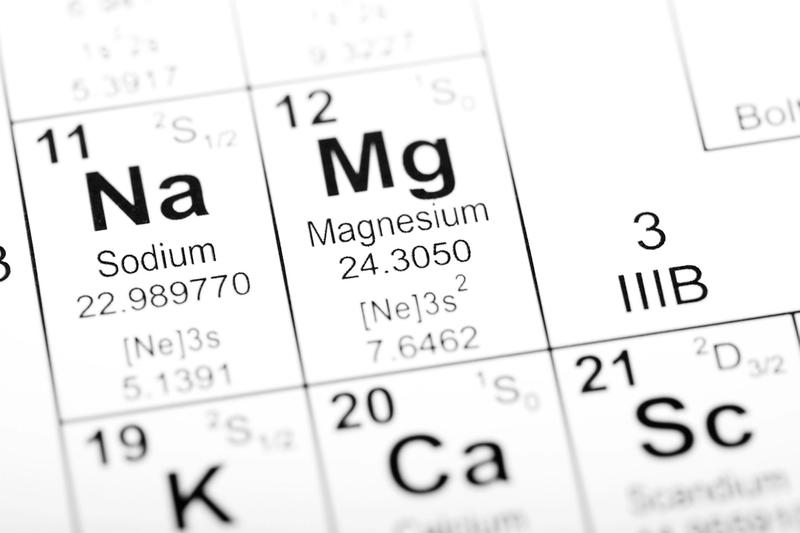
Magnesium
- Also known as:
- mg
| Nutrient reference value | 375 mg |
|---|---|
| Tolerable upper intake level | 375 mg |
About
What if there was a super mineral that served as the perfect all-around tool for your body – an essential ingredient for almost everything? From providing you with morning energy to being the fundamental building blocks of your bones?
Magnesium (Mg) does it all!
It may not always be in the spotlight, but nevertheless, this mineral works quietly in the background.
This article takes you behind the scenes. By the time you finish reading, you'll have a whole new perspective on something you might have considered just a simple element in the periodic table.

What is magnesium?
Found naturally everywhere, from spinach leaves to your teeth, magnesium is an indispensable mineral and electrolyte. With its involvement in over 300 enzyme reactions, magnesium serves as the cornerstone for ensuring optimal muscle function and a well-regulated nervous system.
Read all the way to the end to gain a comprehensive overview and delve into the myriad health benefits that magnesium has to offer.
What are the benefits of magnesium?
Picture your body as a lively party, with magnesium acting as the charming host ensuring everything runs smoothly.
It's not merely a participant; it's the central force orchestrating the music, lights, and the synchronised dance of all the party-goers, from the muscles to the nerves, in perfect rhythm.

Magnesium keeps your energy flowing and keeps you fit. It's like an invisible but essential force that keeps the party - your daily life - going and makes sure everything runs smoothly:
Energy: Magnesium helps convert what you eat into pure energy - it's your .
Bones and teeth: Magnesium works hand in hand with calcium and phosphorus to give you a and healthy bones. Think of this mineral as your personal bodyguard for
Muscle function: This mineral both contract and relax, which is important for everything from writing an email to running a marathon.
Nerve function: It's also important for your - like a toastmaster keeping order around the party table.
Stress management: We live in a busy world and your body needs all the help it can get to . Magnesium plays a role in how your body reacts to stressful situations. It's your personal little zen master to help you stay calm and relaxed!

Sleep and relaxation: Having trouble falling asleep? Magnesium can be your . It helps the body relax and prepare for a good night's sleep. So if you are twisting and turning at night, a little extra magnesium might help.
DNA production: And yes, it also plays a role in the production of DNA and RNA, our body's own little library of .
In other words, magnesium is a key player in your body. It's one of seven essential macrominerals, which means you should get a good amount every day.
How do you get magnesium?
Let's explore the role of magnesium in the foods we eat and the supplements we take to uncover the secrets of how this mineral can boost our daily health and wellbeing.
Let's dive in!
What foods contain magnesium?
Nature's own pantry is full of foods with magnesium:
- Almonds: These small but important nuts are compact energy bombs, full of magnesium. A handful of almonds helps to cover your daily magnesium needs.
- Spinach and other leafy greens: Eating leafy greens is like eating from nature's own pharmacy. Spinach is especially rich in magnesium, a green magician that turns salads and smoothies into powerful nutritional bombs!

- Beans and lentils: These simple but nutritious legumes are rich in magnesium. They act as little nutrition capsules that continuously release valuable nutrients to maintain your energy and health.
- Whole grains: Think of whole grains as robust, nutritional workhorses. Not only are they a source of fiber, but also full of magnesium. By including whole grains in your diet, you're laying a solid foundation for health in your everyday life.
- Seafood: Seafood is a gift from the sea, full of nutrients including magnesium. If you eat seafood regularly, you'll enjoy a world of health benefits.
- Dark chocolate: Sometimes we all need a comforting hand, and dark chocolate not only soothes the soul, but also gives us a good dose of magnesium in every bite.
- Other foods with magnesium: Magnesium is also found in fruits like bananas and avocados, nature's own dessert, full of sweetness and health benefits. Grains like quinoa and oats, and even seeds like pumpkin and sunflower seeds, are also little nutritional jewels in your diet.
So next time you're putting together your meals, consider fortifying them with some of these magnesium-rich foods and let every bite be a step towards better health.
Which magnesium is best?
Magnesium is simply magnesium, right?
If only it were that simple. Let's take a look at the different magnesium supplements available.
Each of them are actually sensitive keys tailored to the body's different needs.

Magnesium-citrat
Magnesium citrate is the preferred option among magnesium supplements, likely due to its combination of affordability and high bioavailability. This indicates that it is readily absorbed and utilized by the body, making it a effective choice for individuals seeking to enhance their magnesium intake.
Magnesium taurate
Magnesium taurate is a unique supplement that combines magnesium and the amino acid taurine, which promotes optimal absorption in the body.
This special composition provides an effective way to increase magnesium levels while helping to stabilise cell walls.
Magnesium taurate is a popular choice for those who want the health benefits of magnesium without certain side effects that other forms can have.
Magnesium-malate
This is an excellent choice for those struggling with fatigue.
Malic acid, a natural fruit acid found in most cells in the body, plays an important role in enzymes that are key to ATP synthesis and energy production (ATP synthesis is the way cells make energy by producing a molecule called adenosine triphosphate - ATP).
And since the ionic bonds between magnesium and malic acid are easily broken down, magnesium malate is also easily absorbed into the body.
Magnesium-glycinate
This is magnesium that has teamed up with glycine, a type of amino acid that the body doesn't necessarily NEED, but is very happy to get.
This form of magnesium is known for its high bioavailability, meaning it is easily absorbed and utilised by the body. It is an ideal choice for those looking to correct a magnesium deficit.
Magnesium chloride
Although magnesium chloride only contains around 12% pure magnesium, it has an impressive absorption rate and is the best form of magnesium for cleansing cells and tissues. Magnesium plays a role in the cell division process.
Magnesium-carbonate
This is another popular and easily absorbed form of magnesium, which actually turns into magnesium chloride when mixed with the hydrochloric acid in our stomach.
This makes it an effective magnesium supplement for those looking to increase their magnesium intake. Its unique properties make it a great choice for supporting overall wellbeing and mineral balance in the body.
Pssst... There are also magnesium supplements that combine the effects of different minerals and vitamins. You may have heard of ZMA, which is often used by people who play sports? It's the combination of zinc, magnesium and vitamin B6.
Steer clear of these
- Magnesium oxide - the most common form of magnesium sold in pharmacies, but this type of magnesium is not bound to amino acids (chelated) and has a poorer absorption rate compared to the other types mentioned above.
- Magnesium sulphate - also known as Epsom salt, is another variant of magnesium. While it's not the most effective way to increase magnesium levels, it is known for its unique properties. One thing to be aware of with magnesium sulphate is that it's easy to overdose.
- Magnesium glutamate and aspartate - avoid these two forms of magnesium altogether. Glutamic acid and aspartic acid, which are components of the artificial sweetener aspartame, can damage nerve function when not bound to other amino acids.

When choosing a magnesium supplement, it's all about finding the supplement that harmonises with your unique health needs.
But remember, as with all important health-related decisions, it's wise to discuss your choice of supplements with a healthcare professional to ensure it's right for you.
Can you get too LITTLE magnesium?
Magnesium deficiency is rare, but it's definitely something of which we should be aware.
Imagine driving a car – you might not realise how important engine oil is until it's too late. Magnesium is the body's oil, essential for many functions, and without enough of it, things can start to creak..
Common causes of magnesium deficiency
What can cause this imbalance?
Here are two 'magnesium thieves':
1: Unbalanced diet: Often, it is a one-sided diet, lacking in colourful and magnesium-rich foods, that is the main culprit behind magnesium deficiency.
2: Alcohol and stress: A lifestyle characterised by heavy alcohol consumption or persistent stress also acts as a thief, depleting the body's magnesium stores. These habits can slowly but surely deplete the body's magnesium account.
Common magnesium deficiency symptoms
Magnesium deficiency symptoms could vary from person to person, but some of the common milder symptoms include: loss of appetite, nausea, vomiting, fatigue, cramps and weakness.
Can you get too MUCH magnesium?
As we've already mentioned, it's rare, but not impossible, to overdose on magnesium.
If you take magnesium supplements as drops without keeping an eye on the amount, you could end up getting too much of a good thing.
According to the NHS it is unlikely to cause harm to have an intake of 400mg or less of magnesium supplement a day.
How much magnesium per day do you need?
Moderation is key when it comes to magnesium intake, just like anything else.
- Infants need 80 mg of magnesium daily, and this need increases with age.
- Adult men and adolescents over 14 years of age should consume 350 mg per day.
- Women, including pregnant and breastfeeding women, need 300 mg daily.
Kilde: European Food Safety Authorities
How about boosting your magnesium absorption?
Here are some effective tips to help you do just that:
- Calcium and the right timing: Did you know that calcium and magnesium can compete for attention in your body? To avoid this, try not to eat foods high in calcium right before or after a meal high in magnesium. It's a bit like giving each of your favourite artists their own stage!
- Be smart with zinc: Taking too much zinc can steal the spotlight from magnesium. So, if you're using zinc supplements, ensure you don't overdo it.
- Vitamin D is your friend: If you don't get enough vitamin D, it can affect your body's ability to handle magnesium.
- Raw is good: Raw vegetables are not only crunchy and delicious, but they are also great sources of magnesium. Cook them less, crunch them more!
- Say NO to smoke: Quitting smoking is good for so many things, including better magnesium absorption. A win-win for your health!
Conclusion
Getting enough magnesium is important, but don't stress too much about it.
Most of us get enough through a varied diet.
But if you're feeling a little lethargic (or just curious), you can have your magnesium levels checked by your doctor.
And remember, food is always the best source of all the good nutrients, including magnesium. But for those who may need a little extra, a magnesium supplement or magnesium tablets can be a great alternative.
Try a magnesium supplement from 4HIM&HER
And here's the good news:
You get magnesium in our 4HIM&HER range. With these products, you not only get the great benefits of magnesium, but also a range of other nutrients that contribute to your health and wellbeing.